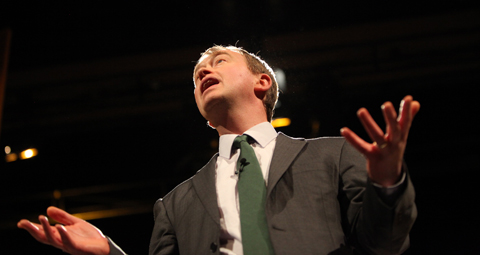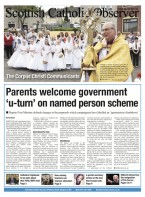June 23 | ![]() 0 COMMENTS
0 COMMENTS ![]() print
print

Illiberal Democracy
The leader of the Liberal Democrats resigned on June 14 citing the intense scrutiny he faced over his Christian faith and the difficulty of ‘remaining faithful to Christ and leading a political party.’
Here, NIALL GOOCH argues that the condemnation of the politician’s private convictions is a ‘disturbing prospect’ and a blow against open and diverse public debate
‘No man can serve two masters: for either he will hate the one, and love the other, or else he will hold to the one, and despise the other.” I wonder whether Tim Farron reflected on those words before he resigned as leader of the Liberal Democrats. In a statement that was unusually personal and heartfelt for a politician, he said that he was torn between living as a faithful Christian and serving as a political leader.
“To live as a committed Christian,” he said, “to hold faithfully to the Bible’s teaching, has felt impossible for me.’
The issue of his Christian faith, and its constant conflict with the dogmas of the sexual revolution, nipped at Mr Farron’s heels throughout his time as Lib Dem leader.
It came to a head during the General Election campaign when he was repeatedly asked whether he believed that gay sex was a sin. For some time he refused to answer the question, before eventually stating that no, he did not believe that.
This was not enough. Last week, just days after the election, the prominent Liberal Democrat peer Brian Paddick resigned, citing his leader’s views. Mr Farron followed suit later the same day.
The resignation feels like a very significant moment for Christians in public life in the UK. What makes it particularly interesting as a straw in the cultural wind is that Mr Farron is by no means a fire-breathing social conservative who wants to overturn the post-1960s social settlement.
He has a very liberal voting record on gay rights, and almost no record of voting pro-life (I worked with various pro-lifers at Westminster over several years and cannot recall ever hearing his name mentioned as a supporter).
That has not been enough to save him. It has not been his voting record or his stated policies that have been deemed unacceptable, but his private convictions. Personally I find this rather a disturbing prospect, and a blow against open and diverse public debate.
It is a matter of legitimate concern what politicians think about issues upon which they might be called to legislate.
However, we must be clear about what comes into this category. No one would have any problem with Mr Farron having to clarify whether he thinks two men should be allowed to marry, or whether gay couples should be allowed to adopt.
Those are political questions, matters of public controversy—or at least they were; in most of the UK, they are now settled for the foreseeable future.
By contrast, the specific question of whether Mr Farron thinks that gay relationships are sinful ought to be no one’s business but his own in a country that respects conscience.
The underlying premises of a liberal society, broadly speaking, are that individuals must tolerate actions that they believe to be immoral if they do not directly harm others, and that law and morality are separate (albeit overlapping) spheres.
If Mr Farron believes that gay relationships are wrong but should be treated equally under law, that is perfectly in accord with this understanding, and is in fact the position that Christians used to be scolded for not taking.
The Farron case has elicited a lot of comment about the increasingly open hostility of secular progressives to Christian belief—and this is undoubtedly real. If we consider their attitude to the Catholic adoption agencies who opposed adoption by gay couples, to Christian florists who do not wish to take part in gay weddings, or to Christian nurses who do not wish to be involved in abortion, then it appears that they agree, ironically enough, with an arch-conservative 19th century Pope, Pius IX.
Pope Pius is associated with the view that ‘error has no rights’ (he never used those specific words in The Syllabus Of Errors, but they do pithily sum up the spirit of that document).
Pluralism and tolerance are out now. The state has declared war on all purportedly unjust customs and institutions, even if by doing so it impinges on the freedom in whose name it supposedly acts.
The stern moral precepts of Christianity, especially around sex, seem to provoke a sort of unreasoning rage in some quarters, an urge to overthrow faith and so silence its demands.
I always think in this context of a slogan used by radical French students in 1968: “C’est interdire d’interdire.”
It is forbidden to forbid. It manages to be both absurd and sinister—as CS Lewis said, ‘nonsense draws evil after it.’
What we have also seen in the Farron affair is the shocking level of sheer ignorance about Christianity.
We can no longer rely on people having even the most basic understanding of what Christians believe and why—and they don’t know what they don’t know.
When Farron noted that Christians think that we are all sinners, this straightforward statement of basic doctrine was met with a wave of uncomprehending disdain. “Speak for yourself Tim, I’m not a sinner,” tweeted Labour MP Jess Phillips.
And yet this is one of the most absolutely basic Christian beliefs, foundational to the whole faith.
“If we say that we have no sin, we deceive ourselves.”
Different denominations formulate the idea differently—we Catholics call it original sin—but without it most of Christianity is unintelligible.
One other question that does arise in the post-Farron era is whether the growth of liberal attitudes to sex among Christians is making public life much harder for their more traditional fellow believers, who now face a difficult question, ie plenty of Christians have found a way to get rid of all the ‘nasty’ stuff about sex; why haven’t you?
There is an answer to this question, but it is a relatively complicated one that requires close and charitable attention to understand, which makes it very poorly suited to public debate in Britain in 2017.
The general perception seems to be that those who decline to take the ‘escape route’ of sexual liberalism are doing so because of an animus towards gay people —and this perception is often reinforced by revisionist Christians themselves, throwing their co-religionists under the bus of assumed bigotry.
It is not hard to see how this perception could lead to the gradual exclusion of Christians from large parts of public life.
However, we should avoid despair. A period of being regarded as a weird and disreputable minority will probably be good for us—as Pope Emeritus Benedict XVI suggested, it may herald a new era of dynamism and creativity in the Church. Christians have often been much too cosy with worldly power and too ready to mistake bourgeois respectability for Christian living. Now we will be forced to choose a master.
PHOTO: LIBERAL DEMOCRATS











